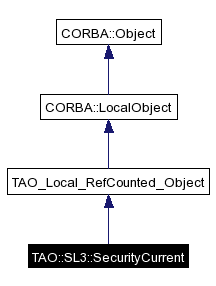
#include <SL3_SecurityCurrent.h>
Inheritance diagram for TAO::SL3::SecurityCurrent:


Public Member Functions | |
| SecurityCurrent (size_t tss_slot, TAO_ORB_Core *oc) | |
| Constructor. | |
| size_t | tss_slot (void) const |
SecurityLevel3::SecurityCurrent Methods | |
Methods required by the SecurityLevel3::SecurityCurrent interface. | |
| virtual SecurityLevel3::ClientCredentials_ptr | client_credentials (ACE_ENV_SINGLE_ARG_DECL) throw (CORBA::SystemException) |
| virtual CORBA::Boolean | request_is_local (ACE_ENV_SINGLE_ARG_DECL) throw (CORBA::SystemException) |
Protected Member Functions | |
| ~SecurityCurrent (void) | |
| Destructor. | |
Private Member Functions | |
| SecurityCurrent_Impl * | implementation (void) |
Retricted Copying and Assignment | |
Prevent copying through the copy constructor and the assignment operator. | |
| SecurityCurrent (const SecurityCurrent &) | |
| void | operator= (const SecurityCurrent &) |
Private Attributes | |
| const size_t | tss_slot_ |
| Thread-specific storage slot assigned to this object. | |
| TAO_ORB_Core *const | orb_core_ |
Thread-specific information may be retrieved from the target security service through this object.
|
||||||||||||
|
Constructor.
|
|
|
Destructor. Protected destructor to enforce proper memory management through the reference counting mechanism. |
|
|
|
|
|
|
|
|
The pointer is actually one to a concrete implementation provided by the underlying security mechanism. For example, SSLIOP implements its own SSLIOP-specific operations corresponding to the ones exposed by the SecurityCurrent interface. Similarly, SECIOP would do the same.
|
|
|
|
|
|
|
|
|
The concrete thread-specific storage SecurityCurrent implementations will each use this slot ID. |
|
|
Pointer to the ORB Core corresponding to the ORB with which this object is registered. Reimplemented from CORBA::Object. |
|
|
Thread-specific storage slot assigned to this object.
|
 1.3.9.1
1.3.9.1